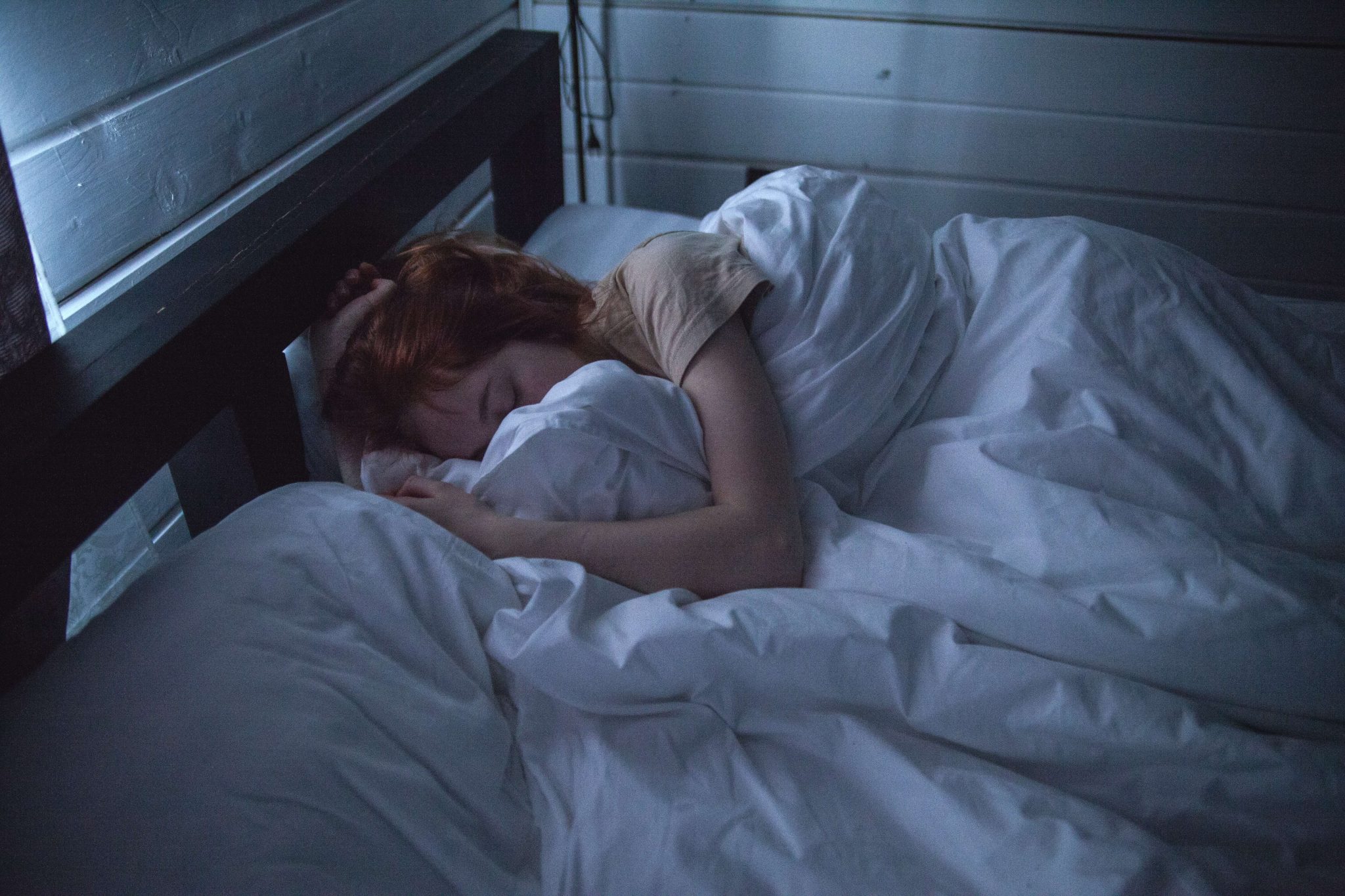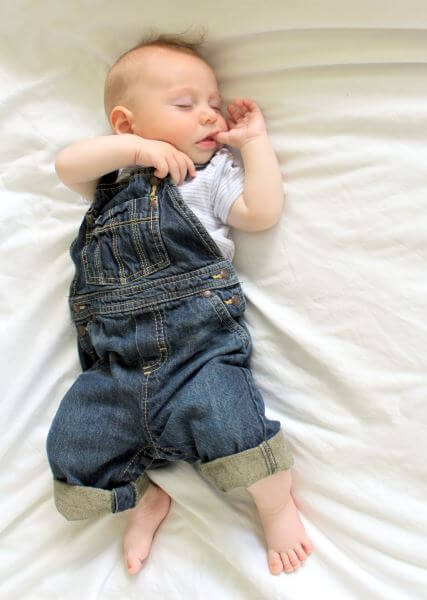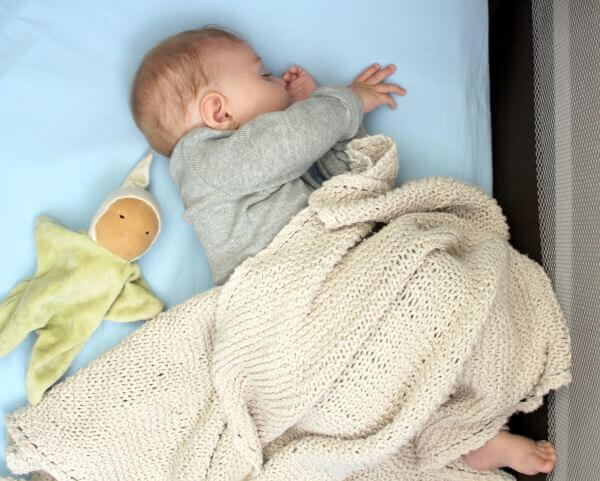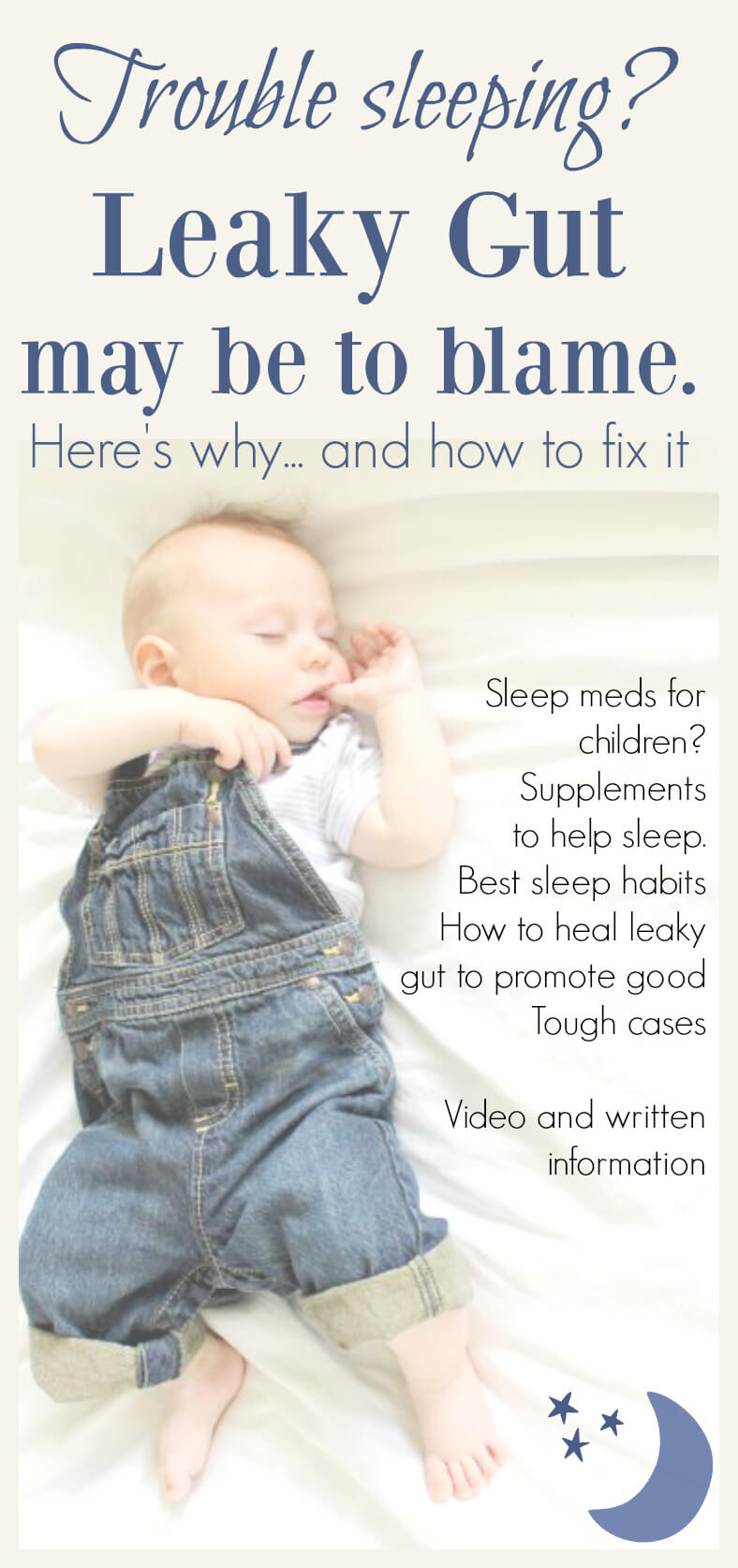
Not being able to sleep causes frustration at night, impaired cognitive function, hyper alertness, cardiological and neurological decrease in function and mortality, mental health issues(1) immune system hinderance (2), obesity (3), and more.
In our children lack of enough sleep can have harmful effects on mood, behavior, performance, social function, and physical health. (4)
Sleep is something that we know we, and our children, need – when we don’t sleep well, we just plain don’t feel good!
Most of us don’t get the rest we need, and that impacts everything else in our life. What if we want to sleep more or sleep better, but our body just won’t cooperate?
Just like everything else, sleep is dependant on a healthy body. But once you reset your sleep rhythms, and eliminate what’s keeping you from getting restorative sleep, you’ll be sleeping better in no time.
Jump ahead:
Problems associated with poor sleep
Conventional Medications
Sleep Solution Video
Sleep Hygiene
Gut-Health Connection
Supplements
References
Lack of sleep and family life
Lack of sleep can not only be harmful to our health, it can overwhelmingly consume every part of every day. Children who are well rested respond better to their parents’ instructions, are less prone to meltdowns, and generally more pleasant to be around.
Consistent bedtimes give parents some much-needed down time at the end of the day, and offer a predictable routine rather than uncertainty.
On the inverse, when we have children who can’t sleep, and we don’t know how to help them, it can be absolutely disheartening. Often these children are exhausted, emotional, and want to sleep, but just can’t.
Even if the parents don’t have sleep issues, having a child with sleep issues is depressing for the entire family. If the parents also suffer from sleep trouble, this can be a double whammy.
Addressing sleep is just as important as nutrition for our physical and emotional well being.
Conventional Sleep Solutions
Doctors and other medical professionals recognize the need for adequate sleep, just as they recognize the need for adequate nutrition. The solutions provided often only solve mild problems or cover up the symptoms with prescriptions that don’t address the root of the problem.
Good Sleep Hygiene
Most sleep books, especially for babies and children focus on sleep hygiene. Good sleep hygiene means that you change your routine and environment to facility your body’s natural ability to go to sleep.
Suggestions typically include:
- Blackout shades on the windows in the bedroom.
- A consistent bedtime every evening.
- A consistent wakeup time every day.
- A consistent and calming bedtime routine.
- No screens late in the day, limiting blue light.
- Only use bed for sleeping (not watching TV or even reading).
- Adequate exercise earlier in the day.
- Limiting or eliminating caffeine.
- Background noise to calm.
The problem with sleep hygiene is that it often isn’t enough, especially when there is a microbiome (gut flora) imbalance.
Sometimes parents will fall into the guilt trap of thinking that the reason their kids don’t sleep is because their bedtime routine isn’t good enough. Placing the blame back on the parents for what actually is a gut-health issue isn’t helpful or productive.
We talk about sleep hygiene and specifically how it helps our body train our sleep hormones in the Holistic Sleep Solution video.
Watch The Holistic Sleep Solution in video format
(In the video above you can skip around to what you want to to hear about by clicking on the time stamps in the description.)
Download the healthy sleep checklist with all 3 parts of this series in one easy checklist
Sleep Medications
1 in 8 adults over the age of 20 report using prescription sleep aids (source). Prescriptions are up 50% in the last decade for those over age 20 and have tripled in the amount they are prescribed to ages 18-26.
Common medications prescribed for sleep include: Trazadone,Benzodiazepines, Doxepine, Eszopiclone, Ambian, and antihistomines.
Side effects associated with these medications can include everything from anaphylaxis, facial swelling, being unable to operate heavy machinery the next day due to grogginess, strange nighttime behavior such as making phone calls or even driving without remembering it, increased bedwetting, addiction, respiratory failure (source), falling the next day (source) and even increased risk of stroke (source) and cancer (source).
There are further links between prescription sleeping pills and increased mortality, but this may be an inverse link – people who are chronically unhealthy (which we well talk about in the Gut Health section), even mildly, may have trouble sleeping be one of their first symptoms and be prescribed sleeping pills more often.
Behavioral Medications
Off-label use of behavioral and antihistamine medications is common for children with sleep disorders (source).
Do medications even work?
Medications like Lunesta, Ambien, and Sonata are shown to be more effective than a placebo, but only marginally so. For example, of the categories of medications studied, they show they only shorten the time it takes to fall asleep by 7-20 minutes, yet also are strongly linked with the side effects talked about above. (source) When measured by polysomography, there was no suggested reduction in nighttime or early wakings when compared to a placebo.
In addition, in the studies compiled above, the majority of studies received funds from private sources (51/56), suggesting that negative results were less likely to be published. Thus, the true estimate of efficacy may be lower than the estimate calculated in the current analysis. (source)
Sleep medications in children are grossly under-studied, so prescription sleep aids in children is largely not evidence-based. (source)
A small study showed that routine diphenhydramine hydrochloride (Benadryl), as is often suggested for use in infants and young toddlers was not an effective long-term sleep aid, so much so that they chose to cut the study short (source).
If medications aren’t even working, or have side effects that are completely undesirable, what do we do?
Because sleep is so important for our body, mind, and social interactions, today we’re going to look at a seldom talked about, but common cause of trouble sleeping – poor gut health.
How does our gut health affect our sleep?
The natural flora (microbiome) in our gut has been shown to affect quality and duration of sleep (source). Part of the reason that people with gut dysbiosis (disrupted gut flora) have a hard time sleeping is that their digestive tract is not processing toxins out as well as it should, so these toxins are in the bloodstream, making their way up to the brain, and can alter mental status enough that the brain can’t facilitate sleep well.
Neurological conditions and sleep
If you’ve talked to a mom that has a child with autism, ADD, or other neurological condition and ask them how their babies slept as newborns and infants, the vast majority of them will have story after story of the crazy things they did to try to get their babies to sleep, without success!
Lack of sleep not only is one of the major predictors of neurological conditions in the future, but lack of sleep can also have a causal relationship of future microbiome imbalance.
What can we do to start healing our gut and sleeping better?
Sleep Hygiene
First, good Sleep Hygiene as we talked about above should be set into place. If that is not enough to help us, or our children, fall asleep, we can look into supplements both long-term and temporarily.We may need to try supplements to correct nutrient deficiencies and try to temper the sleeplessness-causing leaky gut and leaky-gut-causing-sleeplessness cycle.
Specific background music can also help our brain waves settle down into a ‘sleep pattern’ more easily.
Supplements
I had good success with True Calm, an amino acid and herb blend (you can find this here).
Many people who do not find success with GABA (in True Calm) find that L-Carnosine is helpful. You can find L-Carnosine here and read more about it here. I found this helpful when my 2nd son wasn’t ready to give up his naps but was having trouble falling and staying asleep during the daytime as a toddler.
Tart cherry juice naturally raises melatonin level in the body and can even be taken by breastfeeding mothers for their infants.
Melatonin
Melatonin can be useful to temporarily get the body to associate the bed with sleeping and train sleep hormones (source). It is not shown to be habit forming, and is generally recognized as a safe temporary supplement in the US, being the 4th most commonly taken OTC supplement.
That said, melatonin has been banned as an over-the-counter supplement in many parts of the world. It is still available by prescription. In studies on cats and rodents, earlier-onset puberty and reduced size of sexual organs were associated with long-term use of melatonin, so caution is advised (source). All the pros and cons of melatonin is too much to go into in this article, I’ll work on another covering just melatonin as a sleep aid.
Hopefully it goes without saying, but melatonin is something you need to make your own decision about – some day care centers have been found giving melatonin to the children in their care so that they would sleep more, and that is absolutely illegal and they have gotten in lots of trouble for it.
Melatonin is produced by the body naturally from the amino acid tryptophan and folate (read more about different kinds of folate here) is necessary to turn tryptophan into melatonin. You can get this amino acid from:
- Nuts and Seeds (approx 743 mg per cup)
- Meat including red meat, chicken, turkey, and fish (approx 100 mg per oz)
- Cheese (approx 754 mg per cup)
- Oats (approx 315 mg per cup)
- Supplements (500 mg)
Pineal Gland, heavy metals, and melatonin production
The pineal gland’s vulnerability to aluminum is illustrated in a 2015 paper showing that the concentrations of aluminum in the pineal gland were “consistently observed” and “markedly higher” than in other brain tissues examined in people with sleep disturbances, autism, and other neurological disorders.
Detoxing heavy metals improves sleep in many people.
TRS is a safe and effective toxin removal system to help the body more efficiently detoxify heavy metals. Read more about TRS here, or buy here.
Further gut healing
We also need to make healthy changes to our homes and reduce our toxic load – these are pretty basic steps but can make a big difference in our gut health, and therefor our sleep. Click here to get a free printable checklist for a 30-day plan to get this started in simple steps
Next, we try an elimination diet. It’s so common that removing foods that often are allergy-causing, inflammation-causing, and cause a leaky gut. Removing dairy and/or gluten will most often relieve symptoms drastically. And then we can work our way back to really healing our gut with the GAPS diet. (click here for more information on working backwards to the GAPS diet)
Then once we are stabilized and eliminating common allergens from our diet, we can work on restoring gut flora balance and healing the gut. Most importantly, we clean up the gut.
Gut Healing Starter Package
In my Gut-Healing Starter Pack there are two different tracks to get you on gut-healing success. The first is the quick & easy, and is a 30-day program with minor changes that are often enough to heal minor gut dysbiosis and snowball into vibrant health. The second track, which is more intense, can get to the root of most chronic health conditions using the intense GAPS Diet introduction protocol.
Click here to sign up – you get access to both tracks at once and can use what you want from each plan to meet your needs.
When the gut flora is balanced, we should crave healthy food, get restorative sleep, and feel happy and healthy. Taking the first step to heal the gut really will snowball into better health all around.
Why I talk about gut health so often
Going from the standard American diet to the GAPS diet as a desperate attempt to get my daughter to sleep (watch our story here), I saw how gut health impact every aspect of our lives. When we healed leaky gut and provided our body with the nutrition it needed I saw improvements in our family’s ability to deal with stress (me), attention and focus (everyone), chronic eczema (my boys), and more.
That said, gut health is very important but it is not the only thing that is important.
In addition to providing our bodies with the nutrition it needs and avoiding ingesting things that harm our body, it’s important to cover the emotional and social aspects as well. Feeling our feelings, prioritizing social connections, and being involved in our community all provides the balance needed for healthy fulfilling lives.
References:
- https://www.ncbi.nlm.nih.gov/pmc/articles/PMC3972485/
- https://www.ncbi.nlm.nih.gov/pubmed/12651988
- https://www.hsph.harvard.edu/nutritionsource/sleep/
- https://www.ncbi.nlm.nih.gov/pmc/articles/PMC3181901/
- https://www.cdc.gov/nchs/products/databriefs/db127.htm
- https://www.ncbi.nlm.nih.gov/pmc/articles/PMC3943656/
- https://www.ncbi.nlm.nih.gov/pubmed/18555194
- https://www.ncbi.nlm.nih.gov/pubmed/16818836/
- https://www.ncbi.nlm.nih.gov/pubmed/29031742
- https://www.ncbi.nlm.nih.gov/pmc/articles/PMC4157947/
- http://bmjopen.bmj.com/content/2/1/e000850
- https://www.ncbi.nlm.nih.gov/pmc/articles/PMC2219774/
- https://www.ncbi.nlm.nih.gov/pmc/articles/PMC3133850/
- https://www.ncbi.nlm.nih.gov/pmc/articles/PMC5263069/
More in this series:
- Eczema: Is the Root Cause in the Gut?
- The Gut-Flora and Picky Eating Connection
- ADHD: It’s More Than Just Watching Sugar Intake – There’s a Digestion Connection
- The Rheumatoid Arthritis-Gut Connection
- How Lupus is Influenced by Gut Health
- The Depression-Gut Connection
- 5 Unexpected Signs your Gut Health is Off
- Is it genetics? Probably not. It’s gut flora!
- 5 foods that harm your gut, and 5 foods that heal
- The Leaky Gut & Food Allergy Connection

Get the 30 Days to a Healthy Family Checklist

Overwhelmed by making healthy changes? I want to help you get started - get my free checklist that will transform your family's health in 30 days, in small managable steps.




Yes yes yes! Gut health does affect your sleep. As soon as I switched my 7-month son’s probiotics to a more suitable one for him, within a few days his restlessness, knees to chest and plenty of gas was gone! This had been going on for months!
Great article, thank you!